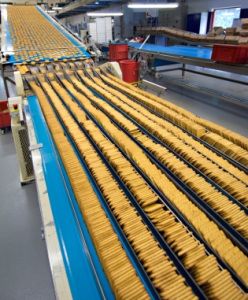Food processing, the transformation of raw materials into consumables, encompasses diverse activities such as harvesting, cleaning, sorting, grinding, mixing, preserving, and packaging. The utilization of food and beverage processing technologies aims to enhance the efficiency, safety, shelf life, and overall quality of the final products.

By adopting advanced technologies and best practices, food processors can reduce waste, boost productivity, and create new revenue streams. Food processing optimization is one of the methods manufacturers must employ to support their operations by optimizing costs and enhancing profitability. This involves utilizing cutting-edge technologies and industry best practices to reduce waste, improve productivity, and create new revenue sources.
Various food processing improvement strategies can be applied based on manufacturers’ unique situations and requirements:
-
Automation:
- Automation, where feasible, reduces labor costs and enhances consistency. Automated sorting and packaging systems, for instance, minimize manual labor, allowing personnel to focus on more value-added tasks.
-
Process Optimization:
- Optimizing each processing step identifies and resolves bottlenecks in overall operations, increasing efficiency and reducing waste. Utilizing advanced technologies such as computer simulations, digital twins, and process control systems can achieve this, with future scenario testing to further improve processing efficiency.
-
Enhancing Energy Efficiency and Upgrading Equipment:
- Energy efficiency is a key focus in the food and beverage industry due to its impact on production, distribution, and the broader supply chain. Upgrading to energy-efficient equipment, such as new refrigeration systems, heat pumps, and developments in electrification technology, can contribute to significant cost savings.
- Pulsed Electric Field (PEF) technology, used in potato processing, eliminates the heating stage, leading to substantial energy reduction and time savings, including reduced fuel consumption and increased yields.
-
By-Product Utilization and Waste Valorization:
- Many food processing operations generate by-products like peels, seeds, and pulp. These by-products can be repurposed for other industries, such as animal feed, biofuels, and paper production. Exploring by-product utilization and waste valorization opens new revenue streams.
-
Using New Supply Chains for Raw Material Production:
- Advances in cell cultivation and precision agriculture provide a method for manufacturing specific ingredients with desired functionalities and product characteristics. These technologies offer a new, secure supply chain for sourcing materials manufactured using these methods.

By incorporating precise fermentation using microorganisms, by-products can be repurposed for various high-value components, contributing to a circular economy and providing additional revenue streams.
It is highly likely that since the initial development of your product, new and improved technologies exist that can significantly enhance your manufacturing process. Food processing technologies can optimize costs, improve processing efficiency, and elevate the quality of food and beverage products. By embracing advanced technologies and best practices, you can reduce waste, enhance productivity, create new revenue streams, and unleash the elusive value and potential within your products.
